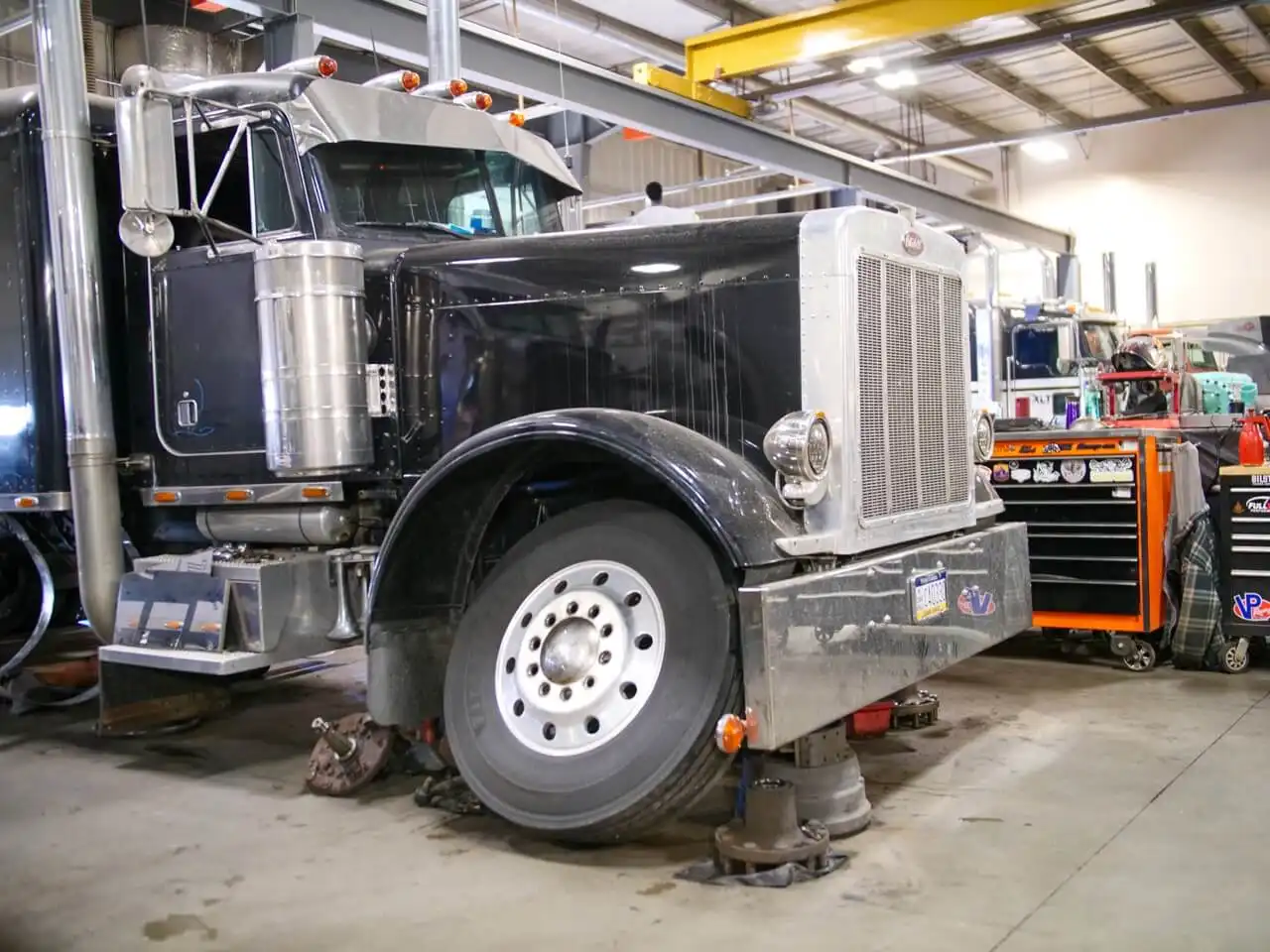September 2, 2025
Extend your truck’s transmission life with proper fluid care, heat management, preventive maintenance, and smart driving habits. Learn essential tips to avoid costly breakdowns and keep your fleet running reliably in Texas.
.jpg)
Why Transmission Longevity Matters
When a transmission fails, the results are catastrophic. Repairs are expensive, downtime is prolonged, and schedules get disrupted. Whether you operate a single truck or manage an entire fleet, transmission failure is the kind of headache best avoided. That’s why investing in the health of this essential system pays dividends in both performance and cost-savings over time.
Understand the Role of Your Transmission
Your transmission is responsible for adjusting gear ratios so your engine can operate efficiently at varying speeds and torque levels. In simple terms? It’s what allows your truck to haul heavy loads without blowing the engine to bits.
There are three common types of transmissions used in heavy-duty trucks:
- Manual Transmission – Offers durability and control but requires a skilled operator.
- Automated Manual Transmission (AMT) – A hybrid system with automatic shifting capabilities.
- Automatic Transmission – Easiest to drive but often more expensive to repair.
Regardless of the type, all transmissions benefit from similar maintenance principles.
Regular Fluid Checks and Replacements
Transmission fluid isn’t just a lubricant—it also cools internal components, reduces friction, and enables smooth gear shifting. Over time, fluid breaks down and becomes contaminated with debris and metal shavings. Left unchanged, this degraded fluid accelerates internal wear.
Best Practices:
- Check fluid levels monthly.
- Replace fluid at manufacturer-recommended intervals (usually between 30,000 to 60,000 miles for heavy-duty applications).
- Always use the correct type of fluid—gear oil for manuals and transmission fluid for automatics and AMTs.
- If towing heavy loads or operating in extreme heat (hello, Texas summers), consider shorter fluid change intervals.
Install or Upgrade a Transmission Cooler
Excessive heat is the number one enemy of your transmission. Overheating causes fluid degradation, seals to harden and crack, and gears to warp.
A transmission cooler regulates fluid temperature by dispersing heat through a radiator-like system. If your rig frequently hauls uphill, idles in traffic, or runs in high-temperature environments, investing in a larger or more efficient cooler can dramatically reduce wear and tear.
Keep an Eye on Warning Signs
Transmission issues rarely pop up without warning. Learn to recognize these early symptoms:
- Slipping Gears – Can indicate worn clutches or low fluid.
- Hard Shifting – May signal misaligned linkages or degraded fluid.
- Delayed Engagement – Often linked to valve body issues or fluid flow problems.
- Overheating – A direct threat to internal components.
Early detection is your best defense. If something feels off, don’t wait—get it inspected before small issues snowball into major repairs.
Service Your Clutch
For trucks with manual transmissions, the clutch is a vital yet consumable component. Over time, clutch material wears down, leading to slipping, shuddering, and hard shifting. Fortunately, clutch adjustments and replacements are routine maintenance tasks.
Clutch Maintenance Tips:
- Adjust clutch pedal free play periodically.
- Avoid “riding” the clutch—keep your foot off when not shifting.
- Replace worn-out clutch components before they damage other transmission parts.
Monitor Transmission Mounts and Shafts
A transmission doesn’t operate in a vacuum—it’s connected to the rest of the driveline via shafts and mounts. Worn or damaged mounts can cause misalignment, leading to vibration, hard shifts, and even internal gear damage.
Check mounts during regular PM inspections. Look for:
- Cracks or sagging rubber
- Loose bolts
- Shaft play or wobble
Stay on Top of Preventive Maintenance
Establishing a regular preventive maintenance schedule is one of the most effective ways to extend the life of your transmission.
Include transmission-specific tasks in your PM checklist:
- Fluid and filter changes
- Clutch inspections and adjustments
- Cooler and line inspections
- ECM diagnostics for AMTs and automatics
Use the Right Driving Habits
Driver behavior plays a massive role in transmission longevity. Teach and reinforce best practices with your team:
- Use engine braking to reduce transmission load on descents.
- Avoid quick starts and harsh shifts.
- Never tow beyond the truck’s rated capacity.
- Allow the truck to warm up before hauling.
Even small changes in behavior can reduce wear, lower operating temperatures, and improve fuel efficiency.
Don’t Ignore the ECU
For trucks equipped with automated systems, the Electronic Control Unit (ECU) controls shifting patterns. Faulty software or outdated programming can cause irregular or harmful shifts.
During service appointments, ask for ECU diagnostics and software updates. This ensures shifting logic remains optimized for your vehicle’s current condition and workload.
Conclusion
By maintaining proper fluid levels, managing heat, practicing good driving habits, and sticking to preventive maintenance schedules, you can keep your transmission running strong mile after mile. For fleet operators and solo drivers alike, proactive care means less downtime, fewer breakdowns, and a longer service life.
If you require transmission repairs or maintenance in San Antonio & Austin, TX, contact Austin Fleet Services today.
AFS News & Articles
Read About The Latest in Industry
Here, you'll find regular articles covering a wide range of topics related to diesel repair, maintenance, and troubleshooting. Whether you're an operator, fleet manager, or diesel engine enthusiast, you'll find something of interest here.
.jpg)
The Role of Aerodynamic Add-Ons in Trucking
Discover how aerodynamic add-ons like roof fairings, side skirts, and trailer tails can reduce drag, boost fuel efficiency, and cut operational costs for heavy-duty trucks across highways.
.jpg)
The Benefits of Window Tinting
Window tinting boosts fleet vehicle safety, reduces heat and glare, protects interiors from UV damage, and lowers HVAC costs—making it a smart, long-term upgrade for trucks operating in sunny Texas climates.
.webp)
How to Prevent Rust and Corrosion in Heavy-Duty Trucks
Rust and corrosion silently threaten heavy-duty trucks, especially in coastal or high-salt areas. Prioritize regular underbody washes, rust-inhibitor sprays, and early surface rust repairs. Protect key systems like brake lines, frames, and battery grounds with targeted maintenance and corrosion-resistant materials to ensure safety, reliability, and longer fleet life.

The Importance of Regular Truck Tire Inspections
Regular truck tire inspections improve fuel efficiency, prevent costly blowouts, ensure DOT compliance, and extend tire lifespan. Stay proactive to keep your fleet running safely.

When to Replace Your Truck’s Air Filters: Key Signs
Replace your truck's air filter when you notice reduced fuel efficiency, loss of engine power, black exhaust smoke, unusual noises, or visible dirt. Regular checks every 10,000-15,000 miles and using quality filters help maintain engine performance, reduce emissions, and prevent costly repairs.

Top 5 Common Diesel Engine Problems and Their Solutions
Learn about the top 5 common diesel engine problems like hard starts, black smoke, and overheating, and their solutions for drivers in Austin and San Antonio, TX.




4 Diagnostic Tips and Tricks to Overcome EGR & DPF Issues
Beat downtime & repair costs! Learn how to diagnose & fix EGR & DPF problems in your commercial trucks. Includes cleaning methods, preventative tips & more.
.webp)
The Latest Advancements & Benefits of Diesel Technology
Diesel engines are an essential part of our daily lives, powering everything from cars and trucks to trains and boats.
Why Choose AFS Truck & Auto Repair Center?
Our Patented Service Vehicles are specially designed and equipped to perform 85% of all vehicle maintenance and repair requirements on site.
"William is a awesome guy. He did a great job. Called about the tandem axle not sliding and helps me fixed some other little issue. I definitely recommend austin fleet services"
"These guys are great, had an emergency with a DEF pump on a black Friday, only shop that picked up the phone, took my driver in immediately and didn't give me the runaround like most do now. I asked not to diagnose anything and just change the pump. Truck back on the road in 3-4 hours and saved us at least 3 days waiting for another shop to open. Definitely coming back here next time our trucks are in the area!"
"Outstanding experience with AFS and George, their knowledgeable mechanic who replaced my valve cover gasket. My vehicle is running smoother than ever. Thank you AFS!"
Contact AFS Truck & Auto Repair Center
Get in touch with AFS Truck & Auto Repair Center today to schedule service in-shop in San Antonio or Austin & Pflugerville, Texas, or via mobile service in the surrounding areas.
Pflugerville, TX 78660
San Antonio, TX 78219
